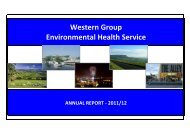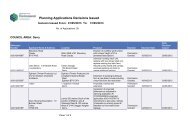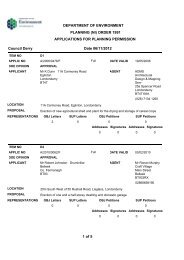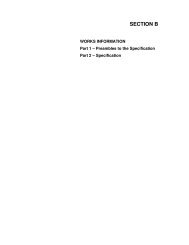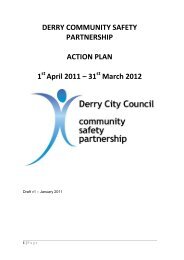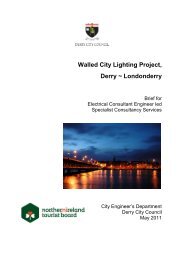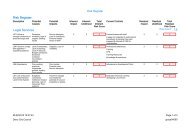Our Ref: DWI/2/10 Event 30/10 Date: 9 June ... - Derry City Council
Our Ref: DWI/2/10 Event 30/10 Date: 9 June ... - Derry City Council
Our Ref: DWI/2/10 Event 30/10 Date: 9 June ... - Derry City Council
You also want an ePaper? Increase the reach of your titles
YUMPU automatically turns print PDFs into web optimized ePapers that Google loves.
3.8.2 It is the Inspectorate’s assessment that, when a significant loss of supplies has been<br />
experienced, a comprehensive programme of water quality checks is necessary and<br />
that such an operational sampling programme should be related to the assessment of<br />
the potential risks to public health. The monitoring programme is necessary to verify<br />
that there has not been a breach of the integrity of the distribution network such as<br />
may be caused by: multiple repairs of burst pipework and fittings; valving operations;<br />
sediment disturbance when service reservoirs are being refilled following significant<br />
depletion; and reintroducing water into the distribution network.<br />
3.8.3 It is not evident from the information made available to the Inspectorate that such a<br />
robust programme was in place during this incident. The Inspectorate is concerned<br />
that there was a reliance on compliance monitoring, with no clear information available<br />
from any specific operational monitoring plan put in place during this incident. The<br />
Inspectorate therefore recommends that NI Water reviews its operational monitoring<br />
plan to take account of the specific circumstances which could be encountered during<br />
such emergency situations and that such a plan should take account of the<br />
assessment of the potential risks to public health.<br />
3.8.4 The Inspectorate has concerns in relation to how NI Water managed the risks<br />
associated with the provision of alternative supplies involving ‘third parties’. The<br />
Inspectorate recommends that NI Water undertake a review of how it can be assured<br />
that, during emergency situations when water is provided to consumers involving a<br />
‘third party’, it has the necessary checks and procedures in place to enable it to<br />
demonstrate to the Inspectorate that the water supplied is wholesome.<br />
3.9 Water treatment works performance<br />
3.9.1 NI Water was required to maximise output from its water treatment works during the<br />
incident. The majority of its works continued to produce high quality drinking water;<br />
however this increased production resulted in short term water quality issues at nine of<br />
the 31 works, due to factors such as: instrumentation faults; freeze/thaw damage;<br />
effectiveness of coagulation at lower temperatures; and operational response to<br />
process alarms. NI Water, through the ‘normal event reporting process, has identified<br />
to the Inspectorate what remedial action has been taken for each of these sites<br />
(Annex 3 refers).<br />
3.9.2 I would emphasise the importance of responding to malfunctions associated with the<br />
telemetry alarms systems especially when critical control alarms are not operational or<br />
are not triggered. This is particularly significant given the importance of the<br />
coagulation process and how it can be affected by many factors, including pH and low<br />
temperatures. I also would emphasise the criticality of optimal operational<br />
performance at water treatment works particularly when there are demands such as in<br />
emergency situations when extra throughput is required and normal working patterns<br />
may need to be adjusted to ensure integrity of the treatment processes.<br />
3.9.3 During this incident there was significant disruption to the production of water within<br />
water treatment works and in its storage and onward distribution. It is critical that, in all<br />
such circumstances, the disinfection process is not compromised. NI Water is<br />
required to ensure it has in place a disinfection policy to cover individual sites where<br />
disinfection is practised and to ensure that this extends to emergency situations where<br />
alternative supplies may be used.<br />
Page 6 of 7







